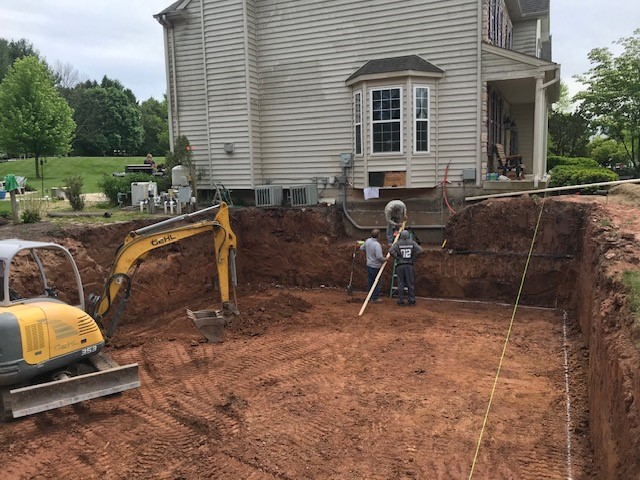Lancaster Excavation - Expert Excavation Services in Lancaster, OH
Lancaster Excavation - Expert Excavation Services in Lancaster, OH
Blog Article
Comprehensive Excavation Strategies: Understanding the Basics for Success
In the world of building and construction and civil design, the relevance of reliable excavation techniques can not be overemphasized. The mindful planning, accurate execution, and meticulous interest to information needed in excavation projects require a thorough technique that encompasses various essential facets. From first dirt analysis to the implementation of precaution and regular progression monitoring, grasping these core elements is vital for attaining success in any kind of excavation undertaking. However, truth proficiency lies not simply in recognizing these fundamentals however in seamlessly integrating them to navigate the complexities of excavation jobs with finesse.
Understanding Excavation Job Planning

The initial stage of any kind of excavation task is the planning stage, where vital choices are made that can dramatically impact the outcome of the job. Comprehending the job scope, timeline, and budget plan restrictions is critical for developing a detailed excavation strategy that makes sure the job's success.
One trick aspect of excavation job planning is the development of an in-depth timeline that details the series of tasks, deadlines, and turning points. This timeline works as a roadmap for the job group, allowing them to track progress and make essential changes to make certain the project stays on timetable. In addition, a well-defined budget plan that makes up all expenses, consisting of tools rental, labor costs, and materials, is vital for preventing price overruns and hold-ups. By meticulously thinking about all these variables throughout the preparation phase, excavation projects can be executed successfully and efficiently, causing successful end results.
Dirt Evaluation and Site Analysis
Carrying out detailed soil analysis and website analysis is an essential action in the prep work phase of any type of excavation task. Dirt evaluation entails establishing the make-up, framework, and homes of the soil at the excavation site. This info is essential for comprehending the dirt's bearing capacity, moisture material, and capacity for disintegration, which are crucial consider establishing the excavation techniques and devices required for the job.
Website examination exceeds dirt analysis and encompasses a wider analysis of the total website problems. This analysis consists of recognizing any type of possible dangers, such as below ground energies, ecological issues, or unsteady terrain, that could impact the excavation process. By thoroughly evaluating the website, task supervisors can develop effective excavation methods that prioritize safety, performance, and environmental management.
Making use of innovative technologies like ground-penetrating radar, dirt tasting, and drone studies can enhance the precision and performance of soil analysis and website examination. Investing time and sources in these initial actions can inevitably save time and stop pricey delays or problems throughout the excavation procedure.
Devices Choice and Application
Reliable excavation tasks count greatly on tactical equipment selection and application to ensure optimum efficiency and efficiency. Picking the right tools for the job is important in optimizing efficiency and decreasing downtime. Elements such as the sort of dirt, depth of excavation, and task scope play a considerable role in determining the most appropriate tools for the task handy.

In enhancement to picking the ideal equipment, proper application is crucial to job success. Operators needs to be educated to manage the tools safely and efficiently - lancaster trenching. Routine upkeep checks and timely repair work help prevent breakdowns and guarantee regular efficiency throughout the task
Safety And Security Measures and Laws Compliance
In the world of excavation tasks, focusing on precaution and compliance with regulations is extremely important to making certain a safe and secure and legally audio operational setting. Precaution encompass a series of techniques, including carrying out complete website evaluations, carrying out appropriate signage and barriers, and giving ample safety and security training for all employees associated with the excavation procedure. Adherence to regulations, such as check out this site OSHA needs in the United States, makes certain that the excavation job meets the required criteria to shield employees, spectators, and the surrounding setting.

Surveillance Progression and Adjusting Methods
Exactly how can project supervisors properly track the innovation of excavation projects and adjust their methods accordingly to maximize results? Monitoring progress is crucial for making sure that excavation jobs stay on track and satisfy due dates. Project supervisors can use various devices and methods to track progress, such as everyday progression reports, regular site examinations, and progressed surveillance technologies like drones and general practitioners tracking systems. By continuously monitoring the job's advancement, supervisors can determine any prospective hold-ups or problems early and take positive procedures to address them.
Conclusion
Finally, mastering the principles of extensive excavation strategies is vital for the success of any type of project. By recognizing job preparation, analyzing soil and website problems, picking appropriate equipment, following security regulations, and checking development, job supervisors can make sure a smooth and effective excavation procedure. Executing these approaches will bring about successful outcomes and decrease potential threats or problems throughout the excavation job.
The preliminary stage of any excavation task is the preparation phase, where vital choices are made that can considerably influence the outcome of the job. Recognizing the project scope, timeline, and budget plan restraints is crucial for developing a thorough excavation plan that guarantees the job's success.
Just how can project supervisors effectively track the development of excavation jobs and adjust their techniques as necessary to optimize outcomes? By closely keeping track of development and being prepared to adjust strategies, project managers can enhance the total success of excavation projects.
By recognizing job planning, assessing dirt and website conditions, selecting ideal equipment, abiding with safety and security laws, and checking progression, project managers can ensure a smooth and efficient excavation process.
Report this page